October 1, 2014 •
Georgia Ethics Commissioners Discuss Path Forward
The state ethics commission met September 30, 2014, for the first public meeting following the firing of former Executive Secretary Holly LaBerge. The commission closed 14 complaints against officials and candidates, approved three new advisory opinions, and discussed the agency’s […]
 The state ethics commission met September 30, 2014, for the first public meeting following the firing of former Executive Secretary Holly LaBerge. The commission closed 14 complaints against officials and candidates, approved three new advisory opinions, and discussed the agency’s future.
The state ethics commission met September 30, 2014, for the first public meeting following the firing of former Executive Secretary Holly LaBerge. The commission closed 14 complaints against officials and candidates, approved three new advisory opinions, and discussed the agency’s future.
New staff attorneys Robert Lane and Bethany Whetzel have identified nearly 200 open ethics cases needing processed.
The commission will continue to consider recently drafted amendments to campaign and lobbying rules with the hope of passing the amendments by the end of the year. The amendments will clarify campaign reporting thresholds, permit gift splitting by lobbyists, and require reporting of gifts to family members of officials.
October 1, 2014 •
2015 Information Added to State and Federal Communications Website
State and Federal Communications is pleased to announce the addition of 2015 legislative session and key dates information to its website. In the Lobbying Laws publication, the key dates information addresses all of the reports and registrations due in 2015. […]
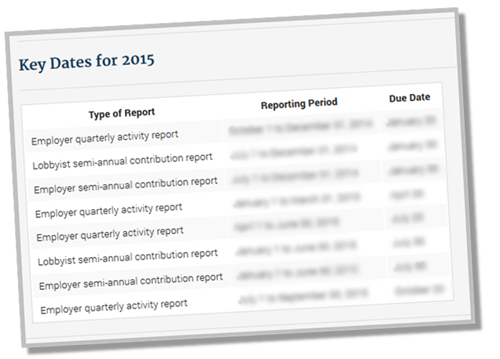 State and Federal Communications is pleased to announce the addition of 2015 legislative session and key dates information to its website.
State and Federal Communications is pleased to announce the addition of 2015 legislative session and key dates information to its website.
In the Lobbying Laws publication, the key dates information addresses all of the reports and registrations due in 2015. In the Political Contributions publication, the key dates address the reports due, the scheduled statewide elections, and, where dictated by the state, scheduled local elections.
This information has been added for the federal government, the states, the District of Columbia, and Puerto Rico. Continue to watch the website for updates to the 2014 and 2015 key dates and for the addition of key dates information for local jurisdictions and for Canada.
September 30, 2014 •
California Governor Vetoes Ethics Bills
Gov. Jerry Brown has vetoed three ethics bills, including one to reduce the value of gifts lawmakers and officials may accept. SB 1443 would have prohibited all gifts from lobbyists and reduced the annual value of gifts from non-lobbyists to […]
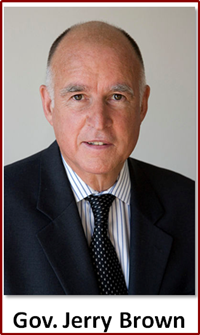 Gov. Jerry Brown has vetoed three ethics bills, including one to reduce the value of gifts lawmakers and officials may accept. SB 1443 would have prohibited all gifts from lobbyists and reduced the annual value of gifts from non-lobbyists to $200 per single source. The bill would have also prohibited officials from accepting tickets to concerts, golf passes, and gift cards.
Gov. Jerry Brown has vetoed three ethics bills, including one to reduce the value of gifts lawmakers and officials may accept. SB 1443 would have prohibited all gifts from lobbyists and reduced the annual value of gifts from non-lobbyists to $200 per single source. The bill would have also prohibited officials from accepting tickets to concerts, golf passes, and gift cards.
Brown also vetoed SB 1442 and SB 831. The bills would have required more frequent campaign disclosures and forced interest groups to offer more information on sponsored trips for lawmakers.
Brown did sign SB 1441 to ban fundraisers at lobbyists’ homes. Effective January 1, 2015, the definition of “contribution” will include the value of lobbyists’ homes if used for a fundraising event.
September 30, 2014 •
Montgomery County, Maryland Passes Public Campaign Financing Bill
County Council has voted to enact public financing for county elections beginning with the 2015-2018 election cycle. Bill 16-14 will establish a public election fund, regulate participating candidates, and authorize the Maryland State Board of Elections to enforce the provisions. […]
 County Council has voted to enact public financing for county elections beginning with the 2015-2018 election cycle. Bill 16-14 will establish a public election fund, regulate participating candidates, and authorize the Maryland State Board of Elections to enforce the provisions.
County Council has voted to enact public financing for county elections beginning with the 2015-2018 election cycle. Bill 16-14 will establish a public election fund, regulate participating candidates, and authorize the Maryland State Board of Elections to enforce the provisions.
To qualify, candidates for county executive or council must demonstrate viability by raising a specific number of small individual contributions between $5 and $150. Candidates for county executive need at least 500 contributions totaling $40,000. At-large council candidates must collect 250 donations worth $20,000.
Maryland lawmakers included a public funding option for counties as part of a 2013 campaign finance reform bill. Montgomery is the first county to pass such a public campaign financing measure.
September 30, 2014 •
U.S. Statehouse Series – Arizona, The Grand Canyon State
Thank you for joining us on another statehouse tour. This week we will be visiting Arizona’s capitol building, located in Phoenix. Arizona’s previous statehouse is now known as the Old Capitol. It is defined by frugality; many of the building’s […]
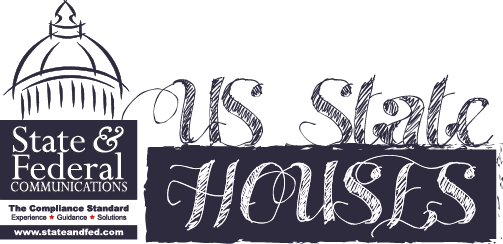
Thank you for joining us on another statehouse tour. This week we will be visiting Arizona’s capitol building, located in Phoenix.
Arizona’s previous statehouse is now known as the Old Capitol. It is defined by frugality; many of the building’s plans did not come into being because they were “too expensive”. These plans included a grand rotunda and wings off the main building for each house. Many of the building’s features were even incorrectly executed by the contractors.
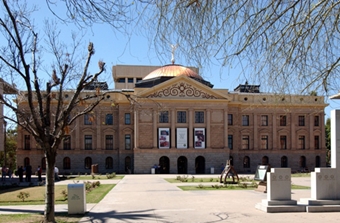 In the mid-1950s, Frank Lloyd Wright drew up plans for a new statehouse, but those plans also were rejected because of cost. The Old Capitol is topped with a copper dome. which is crowned with a statue called Winged Victory.
In the mid-1950s, Frank Lloyd Wright drew up plans for a new statehouse, but those plans also were rejected because of cost. The Old Capitol is topped with a copper dome. which is crowned with a statue called Winged Victory.
The Old Capitol was used as the statehouse from 1901 to 1960. In 1960, separate House and Senate buildings were built on the north and south sides of the Capitol. The Arizona Legislature currently uses these House and Senate buildings. There are plans in the works to build a new Capitol because of the Old Capitol’s inadequacies.
The Old Capitol is now a museum. It exhibits local and state history with an emphasis on the state government and statehood. The museum also has exhibits on historical figures from the state and explanations of state symbols. One of the most notable exhibits there is a silver punchbowl service and silver statue from the battleship USS Arizona. These artifacts survived when the ship was sunk during the Pearl Harbor attack. People of all states can appreciate Arizona’s statehouse for its historical significance and its survival through frugal times.
To learn more, visit the Arizona State Government page.
Photo of the California State House by Jeff Dean on Wikimedia Commons.
The U.S. Statehouse Series is a project of the State and Federal Communications team of summer interns: Alessandra Dickos, Zack Koozer, Elaina Laikos, and Rachel Rodgers.
September 30, 2014 •
Supreme Court Stays Ohio Early Voting Decision
In a 5-4 decision, the U.S. Supreme Court stayed a lower court order requiring the state to begin early voting on September 30, 2014. The stay eliminates the period known as the “Golden Week,” when voters were able to register […]
 In a 5-4 decision, the U.S. Supreme Court stayed a lower court order requiring the state to begin early voting on September 30, 2014.
In a 5-4 decision, the U.S. Supreme Court stayed a lower court order requiring the state to begin early voting on September 30, 2014.
The stay eliminates the period known as the “Golden Week,” when voters were able to register and vote on the same day.
The stay will remain in effect until the state formally appeals the lower court’s order and the Court acts upon that appeal.
September 30, 2014 •
Elizabeth Bartz Honored by Akron Urban League
Elizabeth Bartz, president and CEO of State and Federal Communications, was honored recently by the Akron Urban League as one of seven awardees named Women of Power for 2014. According to the organization’s website, “Women of Power Awards are granted […]
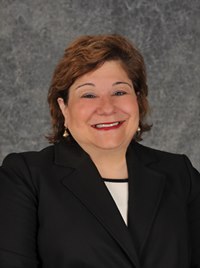
Elizabeth Bartz, president and CEO of State and Federal Communications, was honored recently by the Akron Urban League as one of seven awardees named Women of Power for 2014.
According to the organization’s website, “Women of Power Awards are granted to women who have made a difference in the organizations where they work and also to the community at-large.”
The Akron Urban League is a non-profit working very hard to “improve the economic, cultural, social, educational, and recreational conditions affecting all citizens of Summit County, particularly African Americans, other minorities, and those most in need.”
A luncheon will be held at the Akron Urban League on November 6, 2014.
Congratulations, Elizabeth!
September 26, 2014 •
San Francisco, California Lobbying Regulations Take Effect
New regulations to compliment the Lobbyist Ordinance take effect today, September 26, 2014. Preparation and research are included in the definition of “lobbyist services” and a single conversation (or email) with multiple officials counts as multiple “contacts” for purposes of […]
 New regulations to compliment the Lobbyist Ordinance take effect today, September 26, 2014.
New regulations to compliment the Lobbyist Ordinance take effect today, September 26, 2014.
Preparation and research are included in the definition of “lobbyist services” and a single conversation (or email) with multiple officials counts as multiple “contacts” for purposes of the new registration threshold.
The new regulations are designed to interpret and otherwise provide guidance concerning recent amendments to the ordinance effective July 26, 2014.
September 26, 2014 •
New Jersey Assemblyman Seeks to Abolish ELEC
New Jersey Assemblyman Michael Patrick Carroll recently introduced Assembly Bill 3650 to abolish the Election Law Enforcement Commission, repeal New Jersey’s restrictions on campaign finance and lobbying, and end public financing of gubernatorial campaigns. Carroll claims contribution limits do not […]
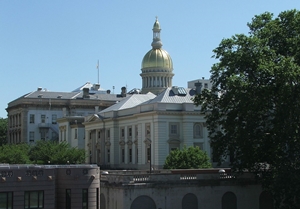 New Jersey Assemblyman Michael Patrick Carroll recently introduced Assembly Bill 3650 to abolish the Election Law Enforcement Commission, repeal New Jersey’s restrictions on campaign finance and lobbying, and end public financing of gubernatorial campaigns.
New Jersey Assemblyman Michael Patrick Carroll recently introduced Assembly Bill 3650 to abolish the Election Law Enforcement Commission, repeal New Jersey’s restrictions on campaign finance and lobbying, and end public financing of gubernatorial campaigns.
Carroll claims contribution limits do not actually limit contributions but simply encourage candidates to find money in other ways, such as through PACs or other non-profit issue advocacy organizations. He said he’s not wholly averse to reporting contributions, however, and suggested the creation of a website to which every candidate would periodically download contribution and expenditure data.
September 26, 2014 •
Administrator of Alaska Legislative Ethics Committee Resigns
Reggie Drummond, administrator of the Alaska Legislature’s Select Committee on Legislative Ethics, resigned effective September 15. He claims he simply did not enjoy the job and was not a good fit. The ethics committee advises legislators on ethical matters and […]
 Reggie Drummond, administrator of the Alaska Legislature’s Select Committee on Legislative Ethics, resigned effective September 15. He claims he simply did not enjoy the job and was not a good fit.
Reggie Drummond, administrator of the Alaska Legislature’s Select Committee on Legislative Ethics, resigned effective September 15. He claims he simply did not enjoy the job and was not a good fit.
The ethics committee advises legislators on ethical matters and has the authority to issue penalties for ethics violations. Although the committee is charged with overseeing compliance with ethical standards, many of the ethics rules remain subject to interpretation. Drummond was not comfortable interpreting a limited statute and admits he failed to read the statute prior to accepting the position in June.
Joyce Anderson, who served as the committee’s administrator for 13 years before retiring earlier this year, has been named acting committee administrator.
September 26, 2014 •
News You Can Use Digest – September 26, 2014
National: Non-Candidate Spending Increases in State Elections The Center for Public Integrity – Rachel Baye, Reity O’Brien, Kytja Weir, and Ben Wieder | Published: 9/24/2014 More than 90 non-candidate organizations have spent $55 million to shape races in 30 states, accounting […]

National:
Non-Candidate Spending Increases in State Elections
The Center for Public Integrity – Rachel Baye, Reity O’Brien, Kytja Weir, and Ben Wieder | Published: 9/24/2014
More than 90 non-candidate organizations have spent $55 million to shape races in 30 states, accounting for roughly 19 percent of state-level political ad dollars. Four years ago, such groups spent $50 million and made up only 12 percent of spending. That translates to about 30,000 more ads this cycle from the groups. The increase in spending by non-candidate committees can be traced, in part, to the U.S. Supreme Court’s Citizen United decision, which gave the green light to unions and corporations to spend unlimited funds on ads supporting or opposing candidates.
Secret G.O.P. Records Reveal Corporate Donors Paying for Access to Governors
New York Times – Jonathan Weisman | Published: 9/24/2014
A recent error by the Republican Governors Association (RGA) resulted in the disclosure of exactly the kind of information that political committees given tax-exempt status normally keep secret, namely their corporate donors and the size of their checks. The documents showed many of America’s most prominent companies had poured millions of dollars into the campaigns of GOP governors since 2008. One document listed 17 corporate members of the RGA’s secretive 501(c)(4), the Republican Governors Public Policy Committee, which is allowed to shield its supporters from the public.
Study: Major companies are increasingly disclosing their political spending
Washington Post – Tom Hamburger | Published: 9/24/2014
Top U.S. companies are reporting more details about their political contributions, according to a survey by the Center for Political Accountability. It scored 191 companies on a complex scale that tracked whether they disclose corporate donations to candidates, parties, or trade associations. The center has been leading efforts to require companies to disclose more about their spending. But the push has drawn criticism from business groups, who say more disclosures offer little of value to shareholders.
From the States and Municipalities:
Colorado – Federal Judge Rejects Citizens United Push to Avoid Disclosure Laws
Denver Post – John Frank | Published: 9/22/2014
A federal judge refused to issue an injunction that would have allowed Citizens United to air and advertise a documentary on Colorado politics ahead of the November elections without disclosing funding behind any advertising related to the movie. Citizens United argued it fell under protections for media and its “Rocky Mountain Heist” film did not constitute electioneering communications. Citizens United President David Bossie said his organization would appeal to the 10th U.S. Circuit Court of Appeals.
Connecticut – Rowland, Ex-Connecticut Governor, Is Convicted in Campaign Finance Case
New York Times – Alison Leigh Cowan | Published: 9/19/2014
Former Connecticut Gov. John Rowland, who resigned from office a decade ago in a corruption scandal, was convicted of federal charges that he conspired to hide payment for work on two congressional campaigns. Rowland served 10 months in prison for taking illegal gifts while in office, and now as a repeat offender faces the possibility of a much stiffer sentence. Rowland could have legally worked for a candidate’s campaign and received payment, had it been properly reported. But Rowland’s problem, as U.S. Attorney Christopher Mattei told the jury, was that candidates valued his experience but his criminal history made the association too risky to be revealed.
Georgia – New Ga. Lobbying Rules Still Allow State Legislators to Accept Lavish Summer Travel
The Tribune; Associated Press – | Published: 9/21/2014
An analysis by The Atlanta Journal-Constitution shows lobbyists spent more than $100,000 hosting lawmakers and state officials at roughly two-dozen summertime conferences. Many were held on the coast of Georgia, Florida, and South Carolina during June and July. That spending increased by about 35 percent from 2012, the year before state lawmakers adopted some limits on lobbyist expenditures. But the new law left open a loophole that still allows lobbyists to pay generously when lawmakers travel for work purposes.
Kentucky – Kentucky Election Finance Leader Retiring
WFPL – Phillip Bailey | Published: 9/19/2014
The Kentucky Registry of Election Finance announced that Sarah Jackson will retire as executive director on November 1. The registry appointed budget analyst Rebecca Feland as the interim executive director. Registry Chairperson Craig Dilger said a search for Jackson’s replacement will take several months. “Sarah has been a tremendous asset to the agency and a true professional as executive director; the agency is stronger for it,” said Dilger.
Maine – Gay Donors Missing History in Maine
Politico – Alexander Burns | Published: 9/22/2014
U.S. Rep. Michael Michaud, who is leading Maine’s gubernatorial race six weeks before Election Day, would be the first openly gay candidate ever to become governor of a state. Michaud has gotten to this point with little help from the wealthiest and most influential gay donors in Democratic politics. Some say it is an illustration of the short shrift progressive donors typically give to state-level elections, as well as Michaud’s own status as a new arrival within the gay political community.
North Carolina – North Carolina, in Political Flux, Battles for Its Identity
New York Times – Richard Fausset | Published: 9/22/2014
Unlike other Southern states, which have shifted decidedly rightward in recent years, North Carolina often seems like it is moving in both directions at once. Barack Obama shocked the political world by winning the state in 2008. Two years later, Republicans wrested control of both legislative houses for the first time in more than a century. In a tight race that could decide control of the U.S. Senate, it is Democrats who hold the advantage in registered voters. “It’s a place on the cusp – there’s really a battle going on for the soul of North Carolina,” said Marc Farinella, who was Obama’s 2008 campaign director in the state.
Rhode Island – Groups Challenge Proposed Changes for Those Lobbying Providence City Council
Providence Journal – John Hill | Published: 9/20/2014
Nonprofit groups criticized as burdensome a proposed lobbying ordinance in Providence that would expand disclosure requirements. They focused on one new rule that would define a lobbyist as someone who advocates for an organization or cause for 10 or more hours a year and is paid $2,500 or more for that work. The current standard is 25 hours a year and $2,500. Councilperson Samuel Zurier said a public hearing on the changes will be scheduled.
Rhode Island – Hearing Officer Rules That Corso Lobbied for 38 Studios Deal
Providence Journal – Katherine Gregg | Published: 9/19/2014
A hearing officer hired by the Rhode Island secretary of state’s office ruled attorney Michael Corso should have registered as a lobbyist on behalf of 38 Studios. Secretary of State Ralph Mollis launched the probe in the wake media reports that revealed no one from 38 Studios registered to lobby when a controversial deal to provide the company with state funds was being put together in the Legislature. A contract showed the company pledged to pay Corso $300,000 to interact with government officials, among other duties. The hearing officer set a deadline for Corso to file lobbyist disclosure reports for 2010, or pay a $2,000 fine.
Virginia – McAuliffe Unveils Ethics Panel to Restore Public Trust after McDonnell Convictions
Washington Post – Laura Vozzella | Published: 9/25/2014
Virginia Gov. Terry McAuliffe laid out an ambitious agenda for ethical and political reform in the state, saying it is essential to restore the public’s trust in its government. McAuliffe appointed a bipartisan commission charged with recommending sweeping changes in the laws regarding gifts, campaign contributions, and public disclosure by state officials. The announcement comes less than a month after former Gov. Robert McDonnell and his wife, Maureen, were convicted of corruption.
Wisconsin – Federal Court Overturns Doe Ruling, Sends it Back to State Judges
Milwaukee Journal Sentinel – Jason Stein, Daniel Bice, and Patrick Marley | Published: 9/24/2014
A federal appeals court removed an injunction halting an investigation into whether Wisconsin Gov. Scott Walker’s campaign illegally coordinated with conservative groups on fundraising and spending as he sought to overcome a recall effort. The decision by a panel of the U.S. Court of Appeals for the Seventh Circuit raised the prospect that prosecutors could eventually resume the investigation even as Walker is engaged in a tight battle for re-election. But now the matter returns to Wisconsin’s courts, where a state judge had in effect stopped the inquiry in an earlier ruling, saying he had found no basis for pursuing an inquiry into campaign finance violations.
 State and Federal Communications produces a weekly summary of national news, offering more than 80 articles per week focused on ethics, lobbying, and campaign finance.
State and Federal Communications produces a weekly summary of national news, offering more than 80 articles per week focused on ethics, lobbying, and campaign finance.
September 25, 2014 •
Bipartisan Panel to Review Virginia Ethics Laws
Gov. Terry McAuliffe announced the appointment of a bipartisan panel to review state campaign finance, gift, and public disclosure laws. The panel is co-chaired by former Virginia Lt. Gov. Bill Bolling and former U.S. Rep. Rick Boucher, who represented a […]
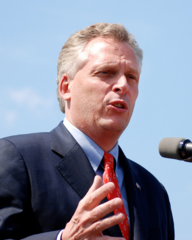 Gov. Terry McAuliffe announced the appointment of a bipartisan panel to review state campaign finance, gift, and public disclosure laws. The panel is co-chaired by former Virginia Lt. Gov. Bill Bolling and former U.S. Rep. Rick Boucher, who represented a district in southwestern Virginia.
Gov. Terry McAuliffe announced the appointment of a bipartisan panel to review state campaign finance, gift, and public disclosure laws. The panel is co-chaired by former Virginia Lt. Gov. Bill Bolling and former U.S. Rep. Rick Boucher, who represented a district in southwestern Virginia.
The governor’s announcement comes just weeks after former Gov. Bob McDonnell was convicted of corruption charges for accepting close to $200,000 of gifts in exchange for public acts.
Other topics on the table include merit selection of judges and redrawing of legislative district lines.
Gov. McAuliffe has asked the panel for a report by December 1, giving the General Assembly time to take action in 2015.
Photo of Gov. Terry McAuliffe courtesy of Kate Wellington in Wikimedia Commons.
September 24, 2014 •
U.S. Statehouse Series – Michigan, The Great Lake State
Welcome back to the statehouse series. Today we travel to the Michigan capitol building. Located in the state capital of Lansing, the Michigan Statehouse that stands today is the third building to house the Michigan government. The original statehouse was […]

Welcome back to the statehouse series. Today we travel to the Michigan capitol building.
Located in the state capital of Lansing, the Michigan Statehouse that stands today is the third building to house the Michigan government. The original statehouse was located in Detroit, Michigan’s original capital. The original statehouse was relocated to a second building in 1847, which was built with a wood frame structure. The present building was dedicated in 1879, designed with Neoclassical and Italianate styles. After a three-year restoration project, the capitol was rededicated in 1992.
The Michigan State Capitol is a truly a magnificent structure, with four-stories, two grand staircases, and a cast-iron dome that displays eight beautifully painted muses. Throughout the interior, the entire white floor tiling is made of Vermont marble and limestone. The only exception is the rotunda floor which is composed of 976 blocks of translucent glass.
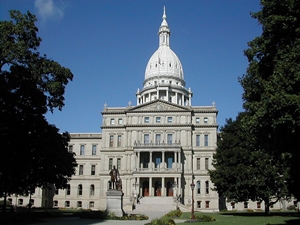 The building also houses the State Senate and House of Representatives chambers, both rooms decorated differently. One features a terra cotta and teal ensemble while the other displays blue and gold. Like many other capitol buildings, the statehouse grounds feature various monuments and statues while highlighted by some not-so-typical notable trees: an Eastern White Pine, the state tree of Michigan; the Dr. Martin Luther King Jr. Tree; and the oldest tree on the grounds, an 1873 catalpa.
The building also houses the State Senate and House of Representatives chambers, both rooms decorated differently. One features a terra cotta and teal ensemble while the other displays blue and gold. Like many other capitol buildings, the statehouse grounds feature various monuments and statues while highlighted by some not-so-typical notable trees: an Eastern White Pine, the state tree of Michigan; the Dr. Martin Luther King Jr. Tree; and the oldest tree on the grounds, an 1873 catalpa.
For more information, such as how to schedule a tour, please be sure to check out the Michigan Statehouse website.
Along with the exhibits about the first governor, there are exhibits about all of the governors and an exhibit about the “Greater Lansing Area Attractions.”
Photo of the Michigan State House by Nikopoley on Wikimedia Commons.
The U.S. Statehouse Series is a project of the State and Federal Communications team of summer interns: Alessandra Dickos, Zack Koozer, Elaina Laikos, and Rachel Rodgers.
September 23, 2014 •
MA OCPF Clarifies Independent Expenditure Registration and Reporting Requirements in Advisory Opinion
The Massachusetts Office of Campaign and Political Finance (OCPF) issued an advisory opinion last week to clarify when an organization may be required to register with the state as an independent expenditure political action committee (IEPAC). An IEPAC is a […]
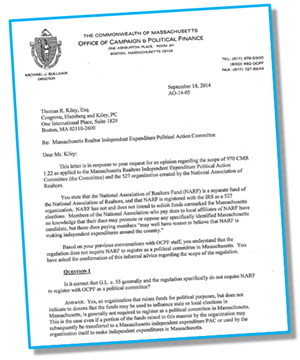 The Massachusetts Office of Campaign and Political Finance (OCPF) issued an advisory opinion last week to clarify when an organization may be required to register with the state as an independent expenditure political action committee (IEPAC). An IEPAC is a political committee or other entity receiving contributions to make independent expenditures.
The Massachusetts Office of Campaign and Political Finance (OCPF) issued an advisory opinion last week to clarify when an organization may be required to register with the state as an independent expenditure political action committee (IEPAC). An IEPAC is a political committee or other entity receiving contributions to make independent expenditures.
On September 18, the OCPF issued AO-14-05, which explains how an organization raising funds for political purposes is generally not required to register as an IEPAC in Massachusetts unless donors are told or otherwise know “that at least a portion of funds given will be used to influence” an election in the state. Registration as an IEPC with the state would not be required even if a portion of the funds raised by the organization is subsequently transferred to a Massachusetts IEPAC or is used by the organization itself to make independent expenditures in the state.
State and Federal Communications, Inc. provides research and consulting services for government relations professionals on lobbying laws, procurement lobbying laws, political contribution laws in the United States and Canada. Learn more by visiting stateandfed.com.


